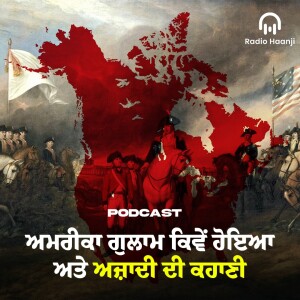
5 days ago
American History Slavery Independence: Radio Haanji Podcast
American History Slavery Independence: Podcast Highlights
The News and Views podcast, aired on Radio Haanji 1674 AM and hosted by Gautam Kapil, recently covered American history slavery independence. As Australia’s top Indian radio station, Radio Haanji connects the Indian diaspora with engaging discussions. This episode examines the origins of slavery in America, its role in the colonial economy, and the path to independence in 1776. Below, we break down the key points in simple language.
The Start of American History Slavery
American history slavery began in 1619 when the first enslaved Africans arrived in Virginia. The News and Viewspodcast explains how European settlers relied on enslaved labor to grow crops like tobacco, cotton, and sugar, especially in the Southern colonies. This system became the backbone of the colonial economy, lasting over 200 years.
Gautam Kapil highlighted that slavery existed in all 13 colonies, not just the South. By the 1700s, millions of Africans were forcibly brought to America, enduring brutal conditions. The podcast shows how this dark period shaped America’s social and economic landscape, leading to tensions that influenced US independence 1776.
The Journey to American Independence History
The path to American independence history began with growing unrest in the 13 colonies. The podcast details how, in the 1760s, colonists opposed British taxes and laws, like the Stamp Act and Tea Act, leading to protests such as the Boston Tea Party in 1773.
On July 4, 1776, the Declaration of Independence was signed, proclaiming freedom from British rule. Gautam Kapil noted a key contradiction: leaders like Thomas Jefferson championed liberty but owned enslaved people. The News and Views podcast highlights how this conflict between freedom and slavery defined early America.
Slavery’s Impact on the Independence Movement
The podcast explores how slavery in America intersected with the fight for independence. Enslaved people saw the revolution as a chance for their own freedom. Some joined the British, who promised liberty for fighting, while others supported the American cause, hoping for emancipation.
Kapil explained that the Declaration’s ideals of “life, liberty, and the pursuit of happiness” excluded enslaved people, creating a moral dilemma. The podcast discusses how this tension set the stage for future conflicts, including the Civil War and the abolition of slavery in 1865.
Key Figures and Events in US Slavery History
The News and Views podcast highlights key figures in American history slavery independence:
- Thomas Jefferson: Authored the Declaration but owned over 600 enslaved people.
- George Washington: Led the revolution while owning enslaved individuals.
- Crispus Attucks: An African-American killed in the Boston Massacre, symbolizing early resistance.
Key events include:
- Boston Massacre (1770): Sparked anti-British sentiment.
- First Continental Congress (1774): United colonists against British rule.
- Battle of Lexington and Concord (1775): Marked the start of the Revolutionary War.
These moments, as discussed on Radio Haanji, show the complex link between slavery and independence.
Why Listen to the Radio Haanji Podcast?
The News and Views podcast, hosted by Gautam Kapil podcast, is a must-listen for the Indian diaspora and history enthusiasts. As Australia’s leading Indian radio Australia, Radio Haanji 1674 AM offers engaging discussions. This episode provides:
- Clear Explanations: Simplifies complex history for all listeners.
- Cultural Connection: Links American history to themes of freedom and justice valued by the Indian community.
- Engaging Insights: Gautam Kapil’s storytelling makes history relatable.
Listen to the episode on the Radio Haanji website or mobile app to explore US slavery history and independence.
Legacy of Slavery in Modern America
The podcast emphasizes that slavery in America created wealth for white landowners but left deep scars of inequality. After independence, slavery continued until the 13th Amendment abolished it in 1865. Kapil discussed how its legacy persists in modern issues like racial inequality. Understanding American history slavery independence, as shared on Radio Haanji, sheds light on America’s ongoing journey toward equality.
Tips to Explore American History Slavery Independence
- Listen to the Podcast: Tune into News and Views on Radio Haanji 1674 AM for Gautam Kapil’s insights.
- Read Primary Sources: Explore the Declaration of Independence at National Archives.
- Visit Museums: Check virtual tours of the National Museum of African American History and Culture.
- Join Discussions: Engage with Radio Haanji’s community events or history forums.
- Watch Documentaries: Stream The 1619 Project for a deeper look at US slavery history.
Why This History Matters
The American history slavery independence story, as covered in the News and Views podcast, reveals the complexities of freedom and justice. It shows a nation fighting for independence while grappling with slavery’s injustice. For the Indian diaspora and global audiences, this history resonates with universal themes of resilience and equality. Understanding these events helps us appreciate the values shaping modern societies.
Other Podcasts:

No comments yet. Be the first to say something!